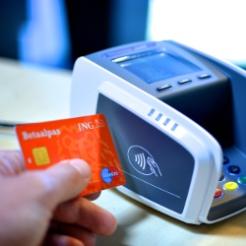There is a “massive future” for charity donations using contactless payment technology, according to a survey by the Charities Aid Foundation.
A 100-day study conducted by CAF in conjunction with Save the Children and Visa Europe revealed that as many as 30 per cent of people were likely to donate using contactless payment if given the option.
The survey revealed that a significant proportion of donors were willing to tap the contactless terminal to give a fixed amount of money in two locations at a London-based Costa coffee shop and underground station.
But Manchester-based concert-goers were “far less” likely to give using the contactless method than with cash, the survey revealed. This was due in part to people being “unfamiliar with the technology” and having “little time”, CAF said.
The survey was created using an innovation team from Visa Europe Collab to create mobile contactless collection tins and countertop donation terminals.
Prototype contactless donation terminals were tested in various locations including a street fundraising drive, the Westfield London shopping centre, a Costa coffee shop counter, Tube station and concert venue.
Chris Allwood, senior product development manager from CAF, said: “We are always looking to the future and we are convinced there is a massive future for donations using contactless technology as people switch from using cash to using cards.
“Contactless cards are still being rolled out but they are clearly seen as the way people will make small payments in the future. It’s vital we are at the forefront of this technology so that charities do not lose out."
In a test at Westfield Shopping Centre that was featured on BBC One's The One Show, contactless collectors were pitted against traditional cash teams of fundraisers. Some 30 per cent of shoppers opted to donate using contactless payment.
The survey revealed that one in five shoppers at the London-based Costa coffee counter who paid by contactless payment, went on to make a charity donation at the contactless terminal. They were 50 per cent more likely to make a donation if asked by the barista.
At Canary Wharf Tube station, some 40 per cent of donors chose to give the fixed amount of £5, while 60 per cent opted for a £1 donation.
Fewer than 1 per cent of concert-goers in Manchester chose to donate using a contactless card.
Gemma Sherrington, director of innovation at Save the Children, said it was "vital" to "explore new ways to engage prospective and existing donors".
"As more people become cashless consumers, charities need to ensure they are able to offer the option to donate via contactless technology – so we were thrilled that Save the Children spearheaded this innovative project,” she said.









